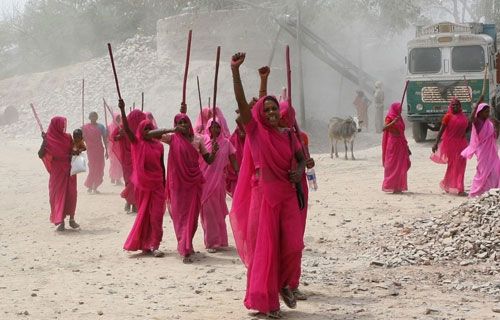States and their systems do not give women justice, nor do women need this, pitiful, so-called justice.
Murders and massacres of women have reached the highest level in India as in all over the world. But there is a community of Indian women. This community is known as the Pink Sari women and justice is based on their own power without waiting for anyone, that is self-defence.
Who is this group that brings a new breath to the women’s struggle? As is well known in India, the caste system still maintains its vitality, while the pressures of Capitalism and the male-dominated mentality also play an active role in the harassment of women. In other words, women were oppressed twice in India.
Women with pink saris consist of a group of women who are subjected to physical violence from their spouses, married off at a young age, insulted by the state, and confident in a group of self-power who are faced with all kinds of physical and intellectual violence of the male-dominant mentality.
Who was this organization founded by?
Gulabi Gang was founded in 2006 by Sampat Pal Devi in northern India.
Sampat Pal Davi is a mother of five children and a former health worker. She was married at the age of 9. We can say that everything began with the rebellion of Sampat.
“Who can fight alone,” says Sambat, one of the founders of this organization, and adds; “Our strength comes from our struggle. I’ve seen what women suffer, my war is not only for myself but for all oppressed women. Women agree with us because they do not want to put up with it anymore, that’s their war. ”
What does this organization, the Gulabi Gang, do?
This organization, which is surrounded by pink, does not only answer the injustices made against women, but also the injustices made because of the fact that women are the essence of society. It does not matter whether the oppressor is a husband, state, police or the world. The important thing is to rebel against justice.
Sampat, who went to the police station to ask about the situation of someone who had been detained in an action against social injustice, was tortured and held in custody for ten days without any charges against him; says: “When I asked him what happened, they did not listen to me. I told them to listen to me, but they told me to not get involved and tried to get me out of there.
I insisted on staying there, but one of them walked over me and tried to beat me. So I shielded my notebook in my face to protect myself and retreated, and when the police became even angrier when started hitting me, I left the notebook and took my stick and hit him on the head. Since then, it happens every day – we go and solve it easily.”
Another similar example is in electricity administration; The officers who cut off the electricity of those who could not pay their bills also face the Gulabi Gang when they ask for bribes to turn the electricity back on. Officers who find women dressed in pink with long bamboo sticks, which they call lathi, realize that they made a mistake.
Another example is; The Gulabi Gang, break the door of the office, which holds the wheat allocated for the poor in the village. This wheat is loaded to the two tractors and shares with those in need.
They make the lives of violent men or state officials a dungeon, and solidify each other’s lives. They describe themselves as follows: “We are called servants, the lower class; because we are the ones who do their laundry, sweep the streets and cut their hair. And that’s why we’re much higher than them.”
Today, the number of Gulabi Gang women has reached almost 100,000 in Banda and its vicinity. They are fighting against the exploitation of their lives. Women’s struggle requires willpower, determination, resistance and faith, a penniless of these women who wear the Pinks says: “This path is not covered with flowers but rather with thorns and only those who carry the world’s ordeal in their hearts have the courage to walk.”




